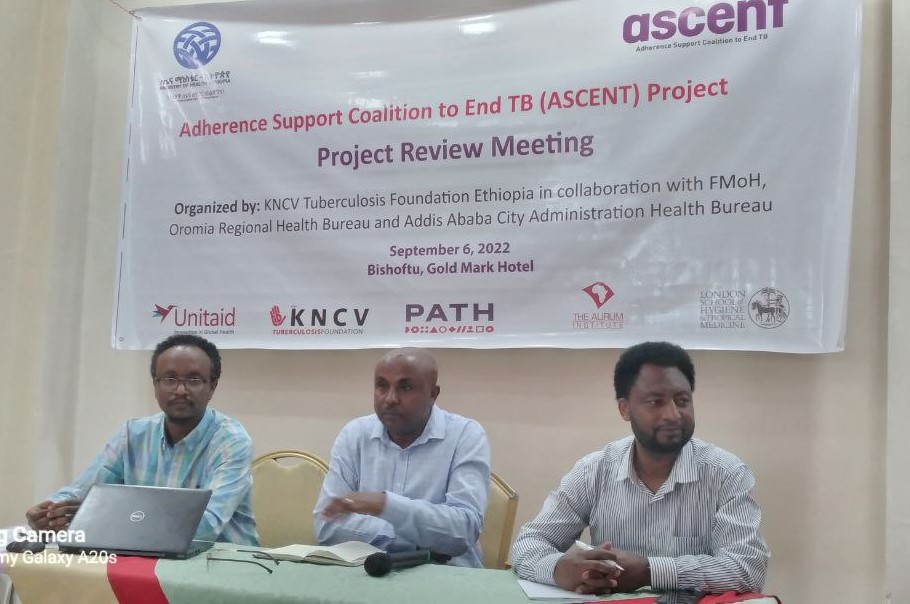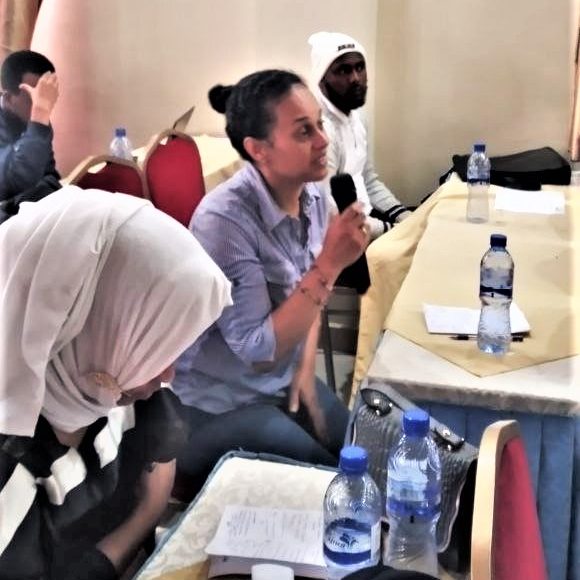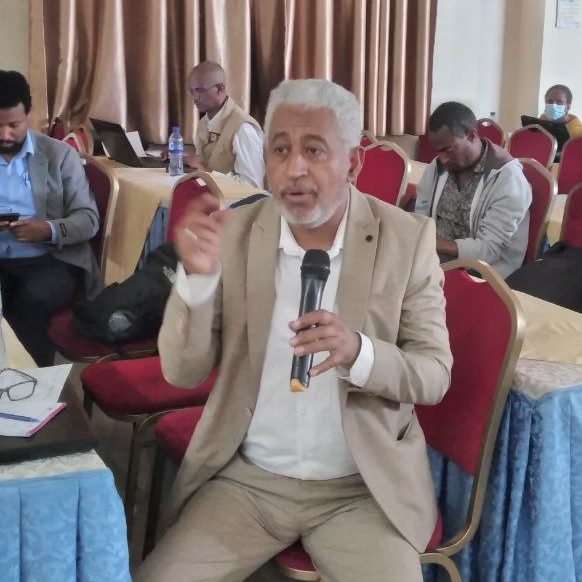ASCENT Ethiopia conducted a one-day review meeting in Bishoftu town Gold Mark Hotel to discuss project implementation and research progress and the transition plan for sustainability and scale-up of the project. The Unitaid-funded, KNCV Tuberculosis Foundation led ASCENT project aims to improve tuberculosis (TB) patient treatment outcomes by the use of digital adherence technologies (DATs). By reviewing the ongoing project, ASCENT Ethiopia aims to further improve the assistance provided for people taking TB treatment.
The meeting, hosted by the ASCENT team, was attended by representatives from Federal Ministry of Health, National TB program, Oromia Regional Health Bureau, Addis Ababa City Administration Health Bureau, key stakeholders, St Peter Hospital, Alert Hospital, EPHI, AHRI, Reach Ethiopia, ETBE, CSOs Organic Health care and Volunteer health Service, the Community Advisory Board (secretary) and intervention facilities TB focal persons from 52 intervention facilities.
Topics of discussion
At the meeting, the project implementation and study progress were presented, as well as the community advisory board site visit report, testimonials on the use of DAT from TB patients and health care workers (HCWs), and the transition plan for sustainability and scale-up of DAT in Ethiopia.
The National TB Program (NTP) has a 58% funding gap for TB program. The available funding is used for finding missed cases, access to GeneXpert, to fill food assistance gap for multidrug resistant (MDR) TB patients, and other prioritized activities. Unfortunately, the sustaining and scale-up of DAT may not be a priority for the NTP with this limited funding.
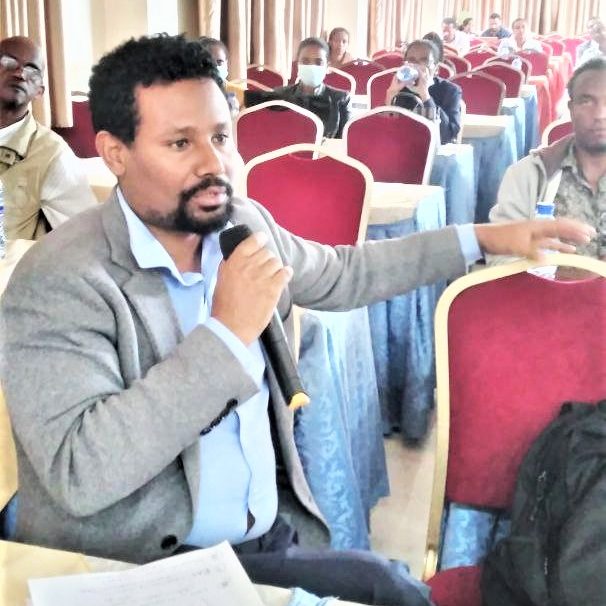
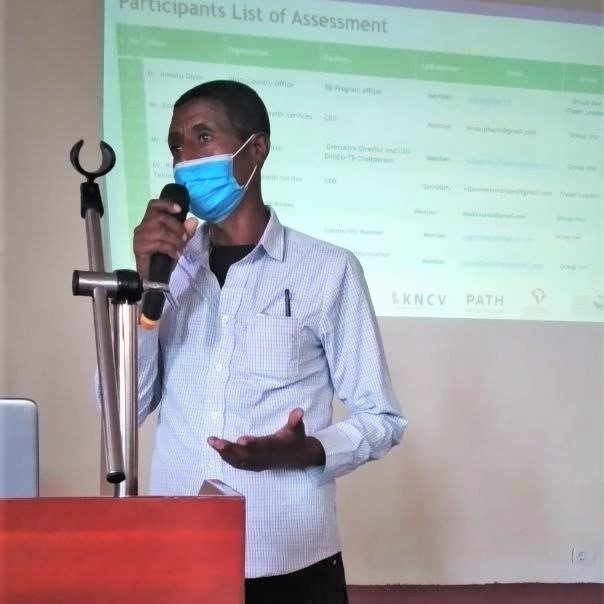
TB survivors, HCWs and community advisory board members gave their testimony about the benefits of DAT in TB treatment. One of the TB survivors, a daily laborer (Alemayehu) who was treated using the medication label/sleeve 99DOTS said that; “If I did not get this technology, I would interrupt my treatment”. He explained the nature of his work, economic burden, daily transport hassle and costs. He expressed his gratitude to the TB focal person at the facility: “I wish that DAT was available for all TB patients on treatment, especially for homeless colleagues”.
A HCW recognized the good time they have with the ASCENT project implementing DAT, and the benefits to their patients and themselves from DAT. He mentioned his worry if using DAT will not be sustained, he said: ”We prefer not to start than breaking it at this stage after witnessing its benefit.” The community advisory board secretary mentioned that; “From the visits made to DAT implementing facilities, we have seen that a high demand is created for use of DAT by health care workers and by patients. It will be difficult to go back to DOT (directly observed treatment) program if there is a break in supporting TB treatment using DAT”.
Besides the appreciative remarks about DAT, the progress of the study was also discussed. Enrolling patients for study data collection finalized in July 2022 and generating evidence from the study is undergoing. Preliminary research findings were discussed on feasibility and acceptability of DAT with differentiated care among ASCENT trial participants to support patient-centered TB care. The ongoing research is expected to generate evidence on the impact of DAT on reducing the catastrophic costs related to TB treatment, which is vital for DAT scale-up and sustainability. With that prediction, we were able to create a common understanding of the status of project activities amongst participants of the meeting.
Follow-up
As a follow-up to the review meeting, we have identified the following steps:
- Finalizing evidence generation on treatment outcome, costing, effectiveness, acceptability and feasibility of DAT and disseminate result to donors and policy makers;
- All stakeholders need to work on mobilizing funds for a 1-to-2-year transition period after the end of ASCENT implementation phase on 31 December 2022, so that the Government of Ethiopia can take full ownership of the implementation of DAT for TB treatment;
- Create a long-term collaboration with the Global Fund to support DAT procurement and distribution (current grant 2020-2024). Next funding application will start in 2023;
- Handle transition activities, such as developing an operational guideline at the NTP level, finalizing local hosting of server, capacity building, and start the write up of hand-over documents.
The Unitaid-funded and supported ASCENT project is led by KNCV Tuberculosis Foundation in partnership with The Aurum Institute, London School of Hygiene & Tropical Medicine, and PATH.
